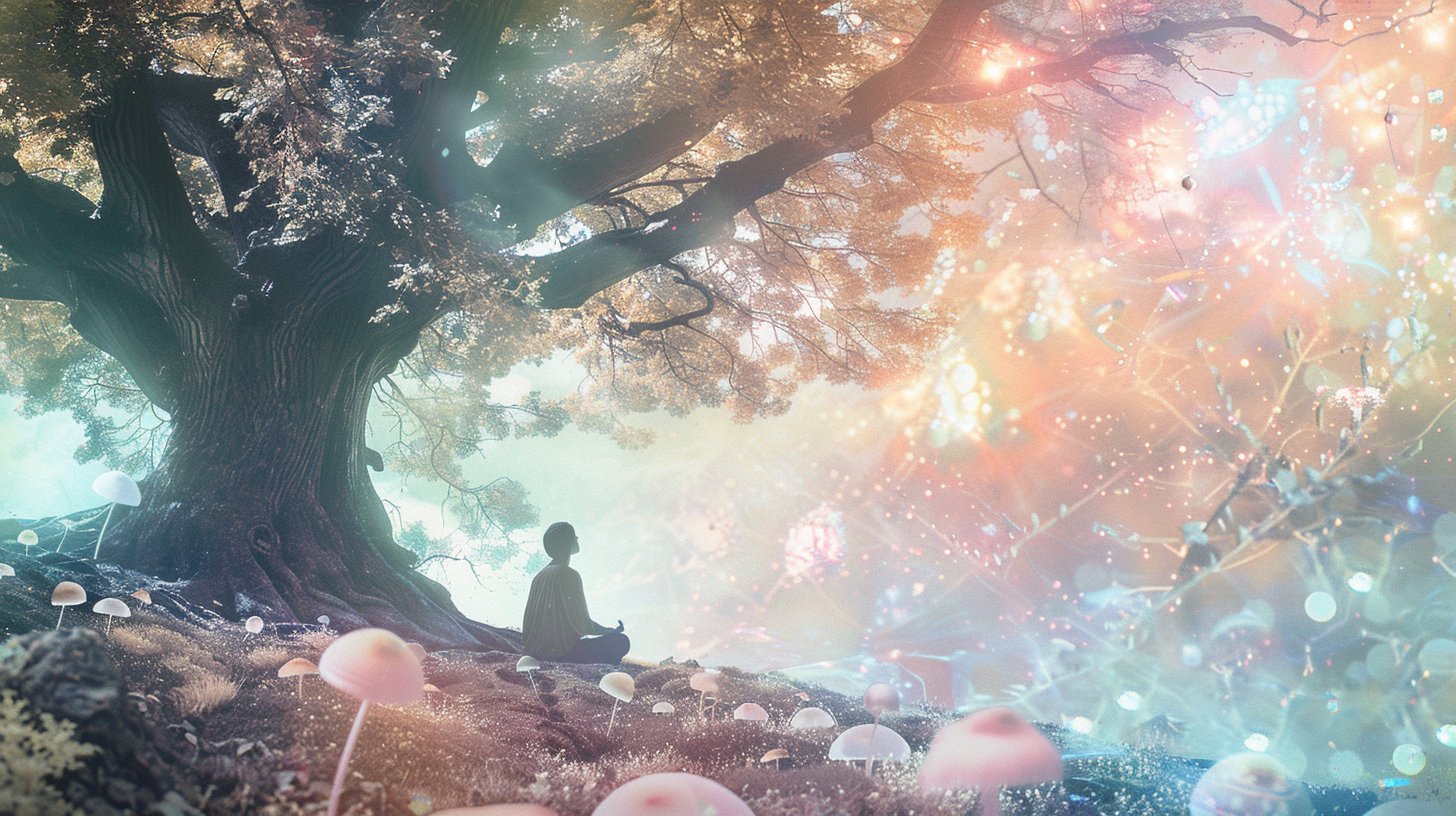
A serene, ethereal landscape with soft, pastel hues where a person is meditating under a large tree. The background shifts into a bright, surreal realm filled with glowing mushrooms and abstract shapes symbolizing the mind. The person appears calm and content, signifying inner peace and healing.
Psilocybin, a compound found in psychedelic mushrooms, has shown promising effects in treating depression. In a revolutionary study published in The BMJ, researchers compared the efficacy of psilocybin and other substances, including escitalopram, in alleviating depressive symptoms. The results could reshape how we approach mental health treatment, especially for patients unresponsive to traditional medications.
“Psilocybin appears to significantly reduce depressive symptoms when compared with standard treatments,” the researchers reported. Their findings suggest a major leap in the use of psychedelics for mental health care, offering hope to millions struggling with depression. The study assessed various substances, such as psilocybin, lysergic acid diethylamide (LSD), and ayahuasca, and their effectiveness in treating depressive disorders.
Comparing Psilocybin to Traditional Antidepressants
This meta-analysis sought to analyze the impact of psilocybin and other substances, including LSD and 3,4-methylenedioxymethamphetamine (MDMA), on depressive symptoms. It compared their effectiveness against the well-known antidepressant escitalopram.
Dr. Johnson, the lead researcher, said, “Patients suffering from major depressive disorders have often faced a lack of effective options. Our study provides compelling evidence for the potential benefits of psilocybin as an alternative treatment.”
The study used a combination of systematic reviews and Bayesian network meta-analyses to assess data across different trials. “It’s about pushing the boundaries and opening new doors for therapies that could drastically improve patients’ lives,” Dr. Johnson added.
Key Findings: Psilocybin’s Standout Role
Psilocybin, when taken as an oral monotherapy, consistently showed a more pronounced reduction in depressive symptoms compared to traditional medications, particularly escitalopram. Using a minimally contextualized framework and validated rating scales like the HAMD-17, the study quantified the change in depressive symptoms. Researchers noticed a clear distinction between the psychedelic treatments and traditional drugs. The primary outcome was the reduction of depression from baseline, with psilocybin taking a noticeable lead.
As the study points out, “Most patients who tried psilocybin reported a substantial improvement in their condition, and the benefits often lasted longer than those experienced with escitalopram.”
However, the researchers also issued caution, citing moderate to low certainty in some treatment comparisons. While psilocybin shows potential, further studies are needed to confirm these effects on a larger scale.
What Sets Psilocybin Apart
What makes psilocybin so powerful in addressing depressive symptoms? According to the researchers, psilocybin seems to promote a deeper introspection and emotional processing that typical antidepressants do not. This phenomenon is often referred to as “breakthrough moments,” where individuals confront and process difficult emotions and trauma in a new way.
In an interview, Dr. Matthews, another expert in the field, noted, “The unique thing about psilocybin is that it does more than just manage symptoms. It appears to give patients a completely new outlook on their mental health, potentially addressing the root causes of their depression.”
The study’s secondary outcomes, which included severe adverse events and discontinuation rates, showed psilocybin had a favorable safety profile, though there was still some risk of transient side effects such as anxiety or nausea.
Patient Perspectives and Future Outlook
The study, though not directly involving patients or public in its design, spoke with patients after submission. Many expressed hope and excitement about the possibility of psilocybin becoming a more mainstream treatment. The study authors believe that with proper training and funding, psilocybin could play a significant role in managing mental health conditions.
According to the researchers, “The feedback from patients who have experienced psilocybin treatment has been overwhelmingly positive, and we believe that the potential for a paradigm shift in mental health care is real.”
While more studies are needed to cement psilocybin’s place in the therapeutic landscape, these early results are undoubtedly encouraging. As Dr. Johnson remarked, “We are on the cusp of something truly transformative in mental health treatment.”
Final Thoughts: A New Hope for Depression Sufferers
The potential for psilocybin to redefine how we treat depression is undeniable. As the medical community continues to explore alternative therapies, it is becoming increasingly clear that psilocybin could soon play a pivotal role in the fight against mental health disorders.
By offering patients a new option, one that goes beyond merely controlling symptoms and potentially addressing underlying issues, psilocybin stands out as a ray of hope in a field often constrained by limited treatment options.
Citation: Johnson M, Matthews D, et al. Comparative oral monotherapy of psilocybin, lysergic acid diethylamide, 3,4-methylenedioxymethamphetamine, ayahuasca, and escitalopram for depressive symptoms: systematic review and Bayesian network meta-analysis. BMJ. 2024;386. doi:10.1136/bmj-2023-078607.





